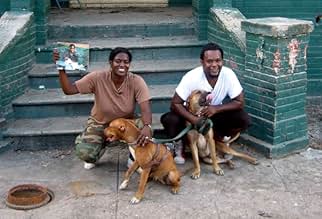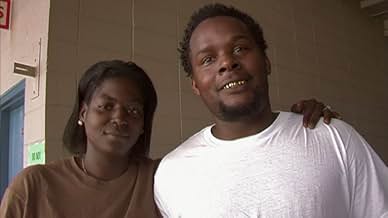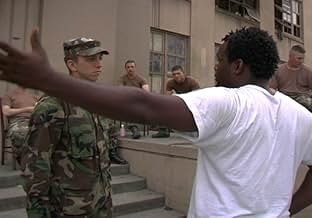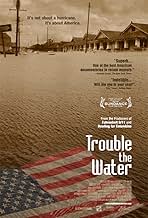A redemptive tale of an aspiring rap artist surviving failed levees and her own troubled past and seizing a chance for a new beginning.A redemptive tale of an aspiring rap artist surviving failed levees and her own troubled past and seizing a chance for a new beginning.A redemptive tale of an aspiring rap artist surviving failed levees and her own troubled past and seizing a chance for a new beginning.
- Nominated for 1 Oscar
- 7 wins & 14 nominations total
- Self
- (archive footage)
- Self
- (archive footage)
- Self - Reporter
- (archive footage)
- (as Julie Chen)
- Self
- (archive sound)
- (voice)
- Self
- (archive footage)
- (uncredited)
Featured reviews
This is a magnificent use of home video built in to a rage against poverty and illiteracy and racism. You can blame the victims here all you want, but image after image, scene after scene the plight of being an African American in this country is shoved in their faces...and in ours.
The lives of this family in the Lower 9th Ward are vividly drawn by themselves. When they confront what is outside, i.e., the post-segregation South, we are startled at the condescension, scorn and devaluation of human lives...if your skin is the wrong color.
The people here have no apologies for their lives. They lay it out and I suspect many will resist what struggles they face. But scene after scene, you can't walk away from this film without a better understanding of racism in America.
The stubborn will ask "Why didn't they leave when they were supposed to?" And this film records "How were they supposed to?" and "Where were they going to go?" In the face of it all, those who survive manage here to triumph. While the footage of the disaster is why most people will buy the ticket to see this, it's the struggle to survive, not only Katrina, that will last in the viewer's mind.
This is the story as told by the people themselves, not by Anderson Cooper or anyone else. This is how the story should be told because these are the people who lived with it. It's not even a story anyone in uniform could tell because they were part of the problem in New Orleans.
One scene of this documentary allows the locals to narrate how they tried to go to a local Navy base in New Orleans which had been evacuated before the storm. It was empty and it had housing for people which wasn't being used. The National Guard who were protecting the building cocked and loaded M-16s and pointed them at the crowd. Nope, these aren't the stories you hear about on CNN.
You won't hear the story about a man in prison for a misdemeanour before the storm hit either. The television was taken away by the guards before footage of the storm was on the air, when the prisoners finally heard that there was a hurricane outside, they were denied food and most of the guards left.
This is a very good documentary, and an important one because it shows the failings of government. The government doesn't fail everyone, it takes very good care of the rich and businesses, which recovered quicker than anyone else in New Orleans. The government failures are biased towards the poor and visual minorities and this doc. pretty much confirms that thesis.
Four years on and not much has changed in the 9th ward, but the casino is open and the tourism department is showing a flashy video urging people to come to New Orleans. The poor black people aren't around any more, except when they're working for minimum wage. The rest have been displaced from the city where they lived but no longer trust to live in anymore.
Katrina is just one of the legacies of the Bush administration and perhaps a strong indication that the US is a country whose power is in decline. What can you possibly say about a country which won't even help its weakest and most destitute citizen? It sucks.
The most amazing footage is the pre-Katrina scenes. Kimberly knows her neighborhood and is a real person. She asks people what they are going to do about the hurricane her uncle buys another bottle of booze, stumbles home, while a 10-year-old pigtailed niece flashes a gang sign, and declares she is not scared of any water.
While I know that neighborhoods like this exist it is still shocking to see people live like this first hand in America. One of the sad strange truths that ooze out of the film is that Katrina is the best thing that ever happened to Kimberly and her friends. The disaster probably saved her life or at the very least gave her a chance at a new one.
Orphaned at 13 when her mother died of AIDS Kimberly is no shrinking violet and she certainly tells it like it is. While Michael Moore veterans Carl Deal and Tia Lessin add structure and social commentary to the film this is Kimberly’s show. The show is both moving and truly fascinating.
Did you know
- Quotes
elderly woman: The water is steady rising in the attic ma'am and I'm gonna drown in the attic.
9/11 dispatcher: Can you break a hole in the attic?
elderly woman: I tried. I broke a chair for it. I cannot pry this wood off this attic ma'am.
9/11 dispatcher: The police are not coming out until the weather conditions get better.
elderly woman: [long pause] So I'm gonna die.
[long pause]
elderly woman: Hello?
9/11 dispatcher: Yes.
elderly woman: I can't get out.
- SoundtracksHurricane Waters
Performed by Citizen Cope
- How long is Trouble the Water?Powered by Alexa
Details
Box office
- Budget
- $900,000 (estimated)
- Gross US & Canada
- $520,151
- Opening weekend US & Canada
- $28,606
- Aug 24, 2008
- Gross worldwide
- $522,766
- Runtime1 hour 30 minutes
- Color
- Sound mix
- Aspect ratio
- 1.85 : 1
Contribute to this page































